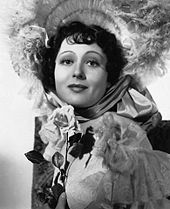
Quick Facts

Biography
Helene Anna Held (19 March 1872 – 12 August 1918), known professionally as Anna Held, was a Polish-born French and later Broadway stage performer and singer, most often associated with impresario Florenz Ziegfeld, her common-law husband.
Early life
Born in Warsaw, Congress Poland, Russian Empire, Anna Held was the daughter of a German-Jewish glove maker, Shimmle (aka Maurice) Held, and his French-Jewish wife, Yvonne Pierre. Sources of her year of birth range from 1865 to 1873, but 1872 has been accepted in general. In 1881, antisemitic pogroms forced the family to flee to Paris, France. When her father's glovemaking business failed, he found work as a janitor, while her mother operated a kosher restaurant. Held began working in the garment industry, then found work as a singer in Jewish theatres in Paris and, later, after her father's death, London, where her roles included the title role in a production by Jacob Adler of Abraham Goldfaden's Shulamith; she was also in Goldfaden's ill-fated Paris troupe, whose cashier stole their money before they ever played publicly.
As a young woman in France, Held converted to Roman Catholicism. She remained so the rest of her life, and declined even to acknowledge her Jewish heritage.
Career
Acting

Her vivacious and animated personality proved popular, and her career as a stage performer began to gain momentum. She was soon known for her risqué songs, flirtatious nature and willingness to show her legs on stage. Around this time, she became the wife of a much-older Uruguayan playboy, Maximo Carrera, with whom she had a daughter, Liane (1895–1988), shortly after their 1894 marriage, and who became an actress and producer, sometimes billed as Anna Held, Jr.
Touring through Europe, Held was appearing in London in 1896 when she met Florenz Ziegfeld. Ziegfeld asked her to return to New York City with him and she agreed. He set about creating a wave of public interest in her, by feeding stories about her to the American press, such as her having had ribs surgically removed. By the time Held and Ziegfeld arrived in New York, she was already the subject of intense public speculation. When she finally performed (in a revival of A Parlor Match), the critics were dismissive of her, but the public liked her.
Broadway success


From 1905, Held enjoyed several successes on Broadway which, apart from bolstering Ziegfeld's fortune, made her a millionaire in her own right. Ziegfeld's talent for creating publicity stunts ensured that Held's name remained well known. Held suggested the format for what would eventually become the famous Ziegfeld Follies in 1907, and helped Ziegfeld establish the most lucrative phase of his career. Held could not perform in the first Follies as she had become pregnant by Ziegfeld in late 1908. In the 1930s, Held's daughter Lianne claimed in her unpublished memoirs that Ziegfeld forced Held to have an abortion because he did not want her pregnancy interfering with Miss Innocence, an upcoming show he had planned for Held. The claim was repeated in a purported autobiography by Held entitled Anna Held and Flo Ziegfeld. Richard and Paulette Ziegfeld, authors of The Ziegfeld Touch, concluded that Held never wrote her memoirs and Lianne was the real author of the alleged autobiography.:23 Eve Golden, Held's biographer, stated that she believes Lianne's abortion claim was likely a lie designed to demonize Ziegfeld whom Lianne loathed.
In 1909, Ziegfeld began an affair with the actress Lillian Lorraine; Held remained hopeful that his fascination would pass and he would return to her, but instead he turned his attentions to another actress Billie Burke, whom he would marry in 1914.
Held spent the years of World War I working in vaudeville and touring France, performing for French soldiers and raising money for the war effort. She was considered a war heroine for her contributions, and was highly regarded for the courage she displayed in traveling to the front lines, to be where she could do the most good. She returned to the United States and starred in the film Madame la Presidente (1916).
Later years and death


The year 1917 was one of constant touring for Held; she toured in a production of Follow Me until ill health caused her to close the show in January 1918. She then checked into the Hotel Savoy in New York City where her health continued to decline.:124 Held died on 12 August 1918 from multiple myeloma at age 46. Her funeral was held at St. Patrick's Cathedral in Manhattan on August 14.:23 Florenz Ziegfeld did not attend as he had a phobia about death and never attended funerals. Held is interred at Cemetery of the Gate of Heaven in Hawthorne, New York.:23
Legacy

The film The Great Ziegfeld (1936) tells a sanitized version of the story of the Ziegfeld-Held relationship. Luise Rainer won an Academy Award for her performance as Held. Ziegfeld and Burke were played by William Powell and Myrna Loy.
In 1978 Columbia Pictures released a made-for-television film, Ziegfeld: The Man & His Women. first telecast on NBC. Held was portrayed by Barbara Parkins.
The American poet Carl Sandburg wrote a memorial poem for Anna Held after Held's death, An Electric Sign goes Dark, in the collection Smoke and Steel.
In 1976 Anna Held's daughter, Liane Carrera (died 1988), opened a museum of her mother's personal and stage items in San Jacinto, California. Liane herself as of 1933 was single with a four-year-old daughter also called Liane.
Filmography
| Year | Title | Role | Notes |
|---|---|---|---|
| 1901 | Anna Held | Herself | Close-up version Short subject |
| 1901 | Anna Held | Herself | Full-length version Short subject |
| 1910 | The Comet | Short subject | |
| 1913 | Elevating an Elephant | Herself | Short subject |
| 1913 | Popular Players Off the Stage | Herself | Short subject |
| 1916 | Madame la Presidente | Mademoiselle Gobette |